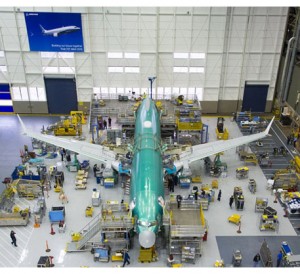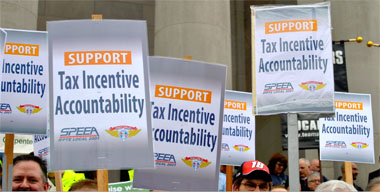OPINION
Legislators must find the courage to hold Boeing accountable
By JOHN BURBANK
(Dec. 2, 2015) — I recently purchased a T-shirt from the Boeing store for my daughter, who is fan of the 737. It says, “If it’s not Boeing, I’m not going!” That may be true for her — but Boeing jobs are certainly on their way out of Washington.
 How can this be? The Legislature met for a three-day special session in the fall of 2013, specifically to put in special tax breaks for the aerospace giant. That bill, sponsored by Rep. Reuven Carlyle (D-Seattle) and Sen. Andy Hill (R-Redmond) was introduced one day, had one hearing in the House, one in the Senate and passed the next day.
How can this be? The Legislature met for a three-day special session in the fall of 2013, specifically to put in special tax breaks for the aerospace giant. That bill, sponsored by Rep. Reuven Carlyle (D-Seattle) and Sen. Andy Hill (R-Redmond) was introduced one day, had one hearing in the House, one in the Senate and passed the next day.
Those tax breaks work out to about $550 million a year. Since they were made law, Boeing has moved 3,600 jobs out of our state. That makes the recent news about the company avoiding $20 million in sales taxes last year an especially bitter pill.
Boeing jobs are going to California, Oklahoma, Pennsylvania, Missouri and South Carolina — but apparently not for the tax breaks in those states. The first three on that list have no special tax breaks for the company. Missouri‘s tax break amounts to $229 million over 10 years, and requires Boeing to create 2,000 jobs to get it. South Carolina’s tax deal totals $1 billion, and requires the company to produce 5,800 jobs in that state.
 Washington’s deal looks like gross largesse by comparison: a total of $12 billion in tax breaks since 2003 — with no requirement for new jobs, or even keeping existing jobs here! (Meanwhile, Boeing is developing a new finishing plant for the 737 in China.) If the Legislature had tied its tax “carrot” to jobs, we could have created up to 11,000 median wage jobs here. That would have been a fair trade.
Washington’s deal looks like gross largesse by comparison: a total of $12 billion in tax breaks since 2003 — with no requirement for new jobs, or even keeping existing jobs here! (Meanwhile, Boeing is developing a new finishing plant for the 737 in China.) If the Legislature had tied its tax “carrot” to jobs, we could have created up to 11,000 median wage jobs here. That would have been a fair trade.
Our legislators can fix what’s gone wrong. In fact, Reps. June Robinson (D-Everett) and 8 other state representatives have proposed legislation to tie tax breaks to jobs. HB 2147 would reduce Boeing’s tax breaks by increments for every drop in Boeing employment, starting with a baseline of 83,295 workers. That was Boeing’s Washington workforce when the tax breaks were passed. If Boeing shed 5,000 workers, then the tax break would dry up completely.
Last session, the House Finance Committee gave this bill one hearing, and then sat on it.
 Reps. Mia Gregerson (D-SeaTac) and 15 of her colleagues have sponsored HB 1786 to require aerospace companies taking advantage of the tax incentives to pay workers who have worked for them for three years at least 80 percent of the state’s median wage (about $16 an hour) by 2016, 90 percent by 2017, and 100 percent by 2018. The House Labor Committee passed this bill. From there, it went to the House Finance Committee, where again, nothing happened.
Reps. Mia Gregerson (D-SeaTac) and 15 of her colleagues have sponsored HB 1786 to require aerospace companies taking advantage of the tax incentives to pay workers who have worked for them for three years at least 80 percent of the state’s median wage (about $16 an hour) by 2016, 90 percent by 2017, and 100 percent by 2018. The House Labor Committee passed this bill. From there, it went to the House Finance Committee, where again, nothing happened.
In January, state lawmakers will return to Olympia. Then those failures of legislative courage can be reversed by ensuring that the billion dollar aerospace tax breaks are tied to keeping good-paying jobs right here in Washington.
Boeing ended its first quarter with a $9.6 billion cash cushion, after repurchasing 17 million shares for $2.5 billion and raising dividends by about 25 percent compared with a year ago. So Monday’s news about the $20 million Washington lost in sales tax revenue to the company looks like small potatoes.
But it’s a big deal for foster kids whose case managers are overstressed and overworked, trying to keep up with a workload that violates standards of care (and basic humanity). That $20 million would enable our state to recruit and pay enough social workers to care for, protect and develop a pathway of hope and opportunity for these foster kids.
Some 32,000 students in Washington state can’t get state financial aid even though they qualify, because legislators cut State Need Grant funding. That $20 million would put college within reach for thousands of these students.
 Those are just two of many examples. So what will it be when the Legislature convenes next month? Lumps of coal for those with the least, and billions of dollars for those with the most? Or will we recognize that giving tax dollars to a corporation that is shifting jobs out of our state is not a smart.
Those are just two of many examples. So what will it be when the Legislature convenes next month? Lumps of coal for those with the least, and billions of dollars for those with the most? Or will we recognize that giving tax dollars to a corporation that is shifting jobs out of our state is not a smart.
John Burbank is the executive director and founder of the Economic Opportunity Institute in Seattle. John can be reached at john@eoionline.org.





